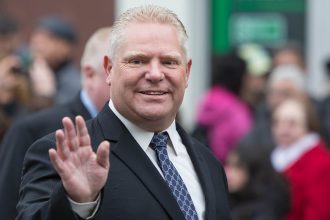On January 30, students running for positions on the Board of Directors of the Management Undergraduate Society (MUS) attended a debate in the Bronfman Building. Candidates ran for positions including MUS SSMU Representative, U1 Representative, U2 Representative, U3 Representative, and Senator.
Moderated by SSMU VP Internal Matthew McLaughlin, the candidates briefly discussed their various platforms before answering questions from the moderator and the audience. The Bull & Bear summarizes the highlights of their platforms.
U1 Second Year Representative:
Kuba Nowosielski believes that the biggest problem currently facing the MUS is the lack of integration for U0 and U1 students. He is running on a platform of increased representation, approachability, and transparency. Nowosielski promises to regularly publish board minutes from meetings, ensure that finances are correct and increase accountability for executives. Nowosielski emphasizes “working more closely with the executive team to ensure oversight and bringing in alumni board members that have experience in the MUS to guide the new members.”
Will Wang says that the promotion of mental health resources is “something we have to prioritize more than anything else.” According to Wang, this year’s MUS Wellness Week was a good initiative that could be improved in the future with the higher turnout “so that students are more inclined to actually reach out for help.” In addition to continuing momentum for mental health initiatives, Wang also proposed offering healthier food options in Bronfman and increasing leadership opportunities for first-year students which would “ultimately drive our competitive performance over top universities.”
U2 Representative:
Tarush Maniktala is the current U1 second-year representative and MUS Finance Office Manager. Building off of his background, Maniktala promises to continue “a strong commitment to fiscal responsibility.” He believes that areas to improve in the future are “reimbursements, maintaining a strong budget, financial support for clubs and responsiveness of MUS executives to students and their requests.” Maniktala also emphasizes a strong commitment to enhancing the quality of student life through improved channels of communication and mental health resources.
U3 Representative:
Riley Wolever believes that he could add an “outsider perspective to the MUS.” Wolever says that his experience in other co-curricular activities has provided him with “time management skills, exposure to people outside the program, [and] recruiting experience.” Wolever’s platform includes increasing involvement for first-years and specifically encouraging international students to engage with the MUS.
President:
Brooke Callaghan is currently the Management SSMU Rep and the Chairwoman of the Board of Directors. She too believes that mental health is a critical issue and asserted that “low student engagement is not a result of sentiment.” Callaghan plans to “make it easy and comfortable for students to connect with mental health resources.” She also stressed the importance of increasing the number of positions in First Year Involvement Team (FIT) and “making sure that more than 270 students hold positions” in the MUS. Callaghan plans to “prioritize sustainability rather than survival” in terms of financial responsibility and to create additional positions to assist the VP Finance. She also wants to provide academic credit for executive roles, “as they require considerable time and energy.” Stating that the biggest issue in the MUS is a lack of involvement, Callaghan wants to “make Bronfman a community for everyone.”
SSMU Representative:
Elan Eisner expressed his “love for the faculty and a desire to help improve it.” His past experience includes a role as Sales Manager on the Corporate Relations Team and Executive Assistant to President O’Nell Agossa. Eisner, who worked closely with the MUS Wellness Week initiative, promises to improve student involvement and mental health resources, issues which he believes are closely linked. He believes that “more SSMU visibility and a personal addendum to the listserv” will help gauge his constituents’ views and provide proper representation. Eisner also to “achieve high levels of SSMU funding for MUS clubs [by] sitting on the funding committee.”
Jonathan Gurvey believes that “misconceptions about [the MUS] being uncaring and cutthroat are not well-based.” His platform includes fostering more communication and involvement between SSMU and the MUS by communicating student positions and volunteer openings to MUS students. He plans to sit on the finance committee to fund more student-led initiatives and “increase the day-to-day impact” of the MUS Board of Directors. Gurvey also promised to push for a Fall Reading Week and stronger executive oversight. He plans to “implement alumni on the BOD” who can provide insight into “successful institutional learning and consistency.”
Matthieu Kamwa suggests “collaboration, advocacy, and exposure to revitalize the relationship between the MUS and SSMU.” His platform includes “making communication [of SSMU operations] more easily accessible to students” and promises to prioritize the desires of Management students. Kamwa also discussed his wish to “expand the Bronfman bubble” by “creating a cross-faculty event to open exposure to other faculties.”
Senator:
Henri Schoucair wants to “develop and build a bridge between the MUS, SSMU, and the Senate.” Schocair’s platform includes fighting for the implementation of a Fall Reading Week, more standardized grading processes across faculties and the development of additional scholarships. He wishes to “enhance cooperation and communication” across the faculty.


